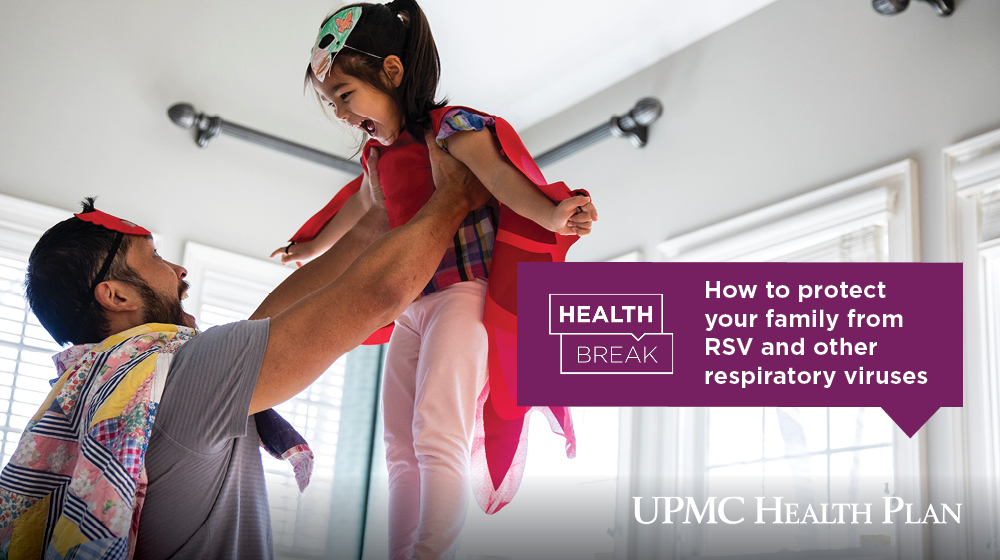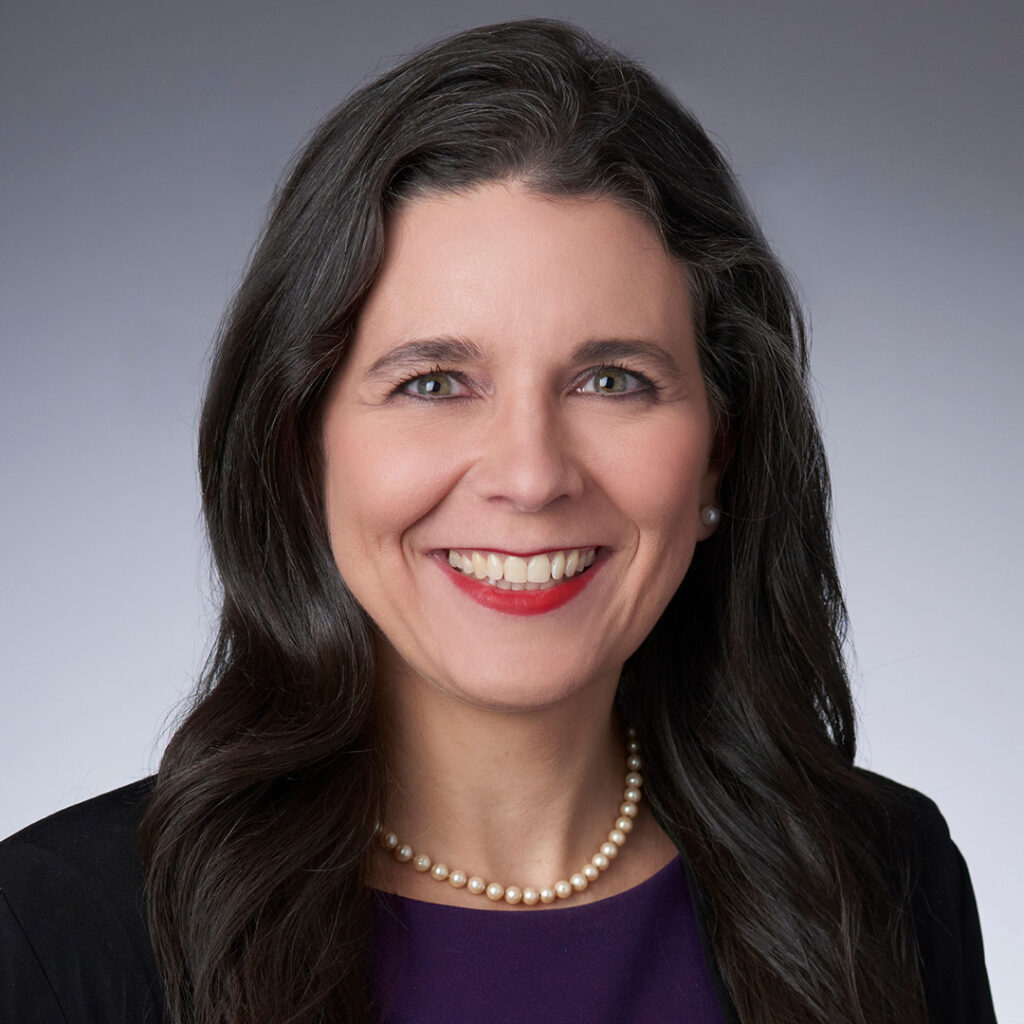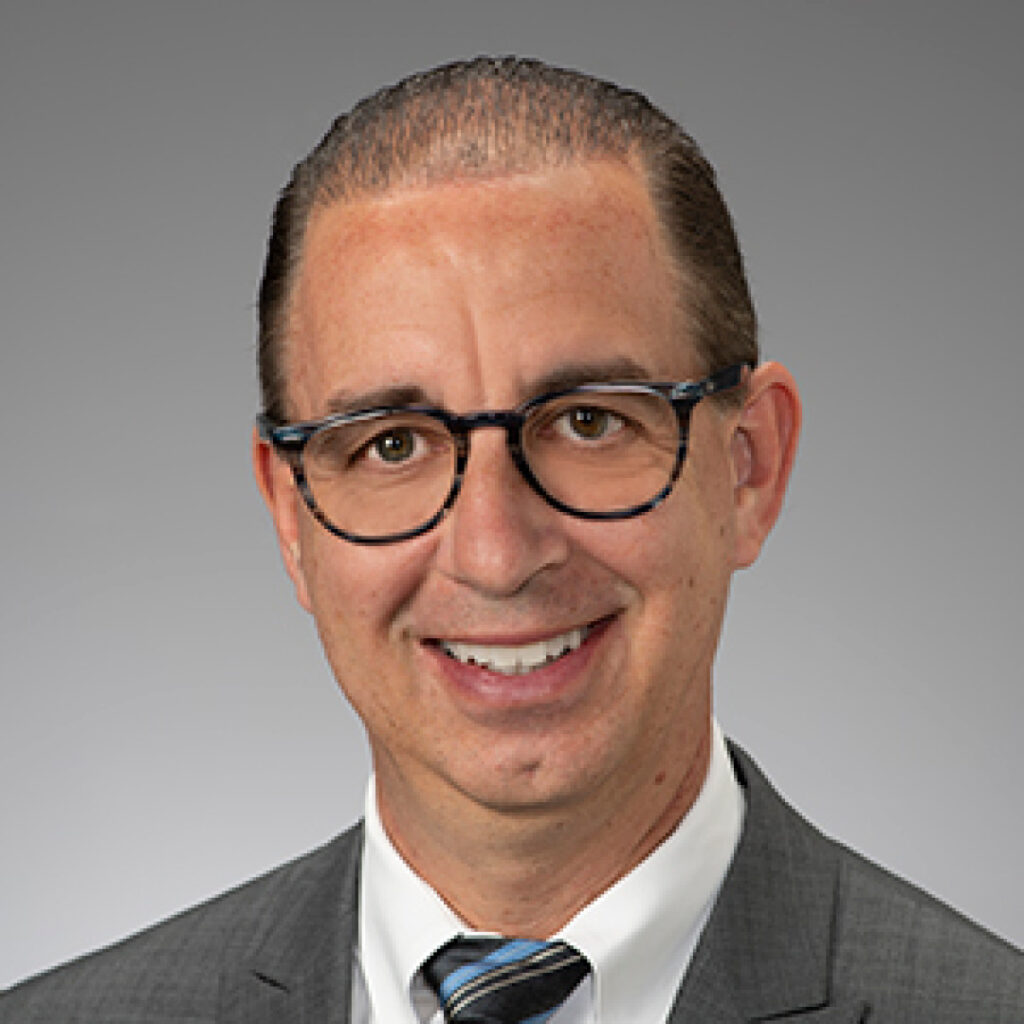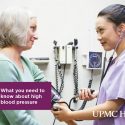Health Break: How to protect your family from RSV and other respiratory viruses

A podcast for UPMC Health Plan members, Health Break is your quick guide to caring for your mental and physical health, prioritizing wellness, and making the most of your health insurance plan.
Episode 52: Take a Health Break with Dr. Johanna Vidal-Phelan and Dr. Robert Rutkowski
Respiratory syncytial virus, or RSV, has been making the news lately. Tune in to learn what it can feel like and how you can protect your family from getting sick. You’ll hear about everything from symptoms to vaccines.
Episode transcript:
Camille: Welcome to Health Break by UPMC Health Plan, your quick guide to health, wellness, and how to make the most of your health insurance plan. I’m your host, Dr. Camille Clarke-Smith. This is your…Health Break.
In this episode, Dr. Johanna Vidal-Phelan and Dr. Robert Rutkowski take a Health Break to talk about RSV. They will discuss how getting vaccinated against the respiratory virus can help protect your family and you from getting sick from it. Dr. Bob and Dr. Johanna, thank you so much for taking a Health Break with us.
Dr. Rutkowski: Thank you so much.
Dr. Vidal-Phelan: Thank you for having us.
Camille: As two pediatricians, we’re really happy that you’re able to talk to us about this important topic. So, Dr. Bob, my first question is for you. We’re hearing more about RSV these days. Can you tell us, what is it, and is it a new disease?
Dr. Rutkowski: Sure. RSV stands for respiratory syncytial virus. That sounds scary, but it’s actually a virus that most usually causes a cold with very mild symptoms. It can take about two weeks to get better from, but it can be more severe in newborns, infants, and older adults. RSV is not new. It was discovered in the 1950s. We’re hearing more about it since we can prevent it, especially in those most vulnerable age groups.
Camille: So Dr. Johanna, could you tell us more about the symptoms of RSV and how they develop?
Dr. Vidal-Phelan: That’s a great question. The symptoms of RSV are multiple. So for example, you could see a young child with a lot of nasal congestion, a runny nose, coughing, sometimes wheezing, sneezing, fever, decreased appetite, and this is definitely very concerning for little ones because of the congestion that RSV can cause in little children. It makes it difficult for them to feed, especially if they’re breastfed or drinking from a bottle. As the result, many children in this age group may present with dehydration. Another symptom that we often see with RSV is called apnea. Apnea is when a child pauses breathing for more than 10 seconds. Unfortunately, during the RSV season, many babies require hospitalizations due to dehydration or respiratory distress. RSV can be particularly dangerous to newborns, especially those that are premature, have chronic lung disease, or have a weakened immune system. If you are exposed to the virus, infected people usually develop symptoms in four to six days and unfortunately can infect others one to two days before starting to show signs of illness. I think it’s also important to let the public know that because RSV is a viral infection, treatment is primarily symptomatic. Antibiotics do not work against this virus or any other viruses. Fortunately, we now have a new vaccine that is available to help protect babies against RSV.
Camille: It sounds like the RSV immunization and vaccine has really been a game changer. Dr. Bob, could you explain more about who is eligible and when?
Dr. Rutkowski: This is a fairly complicated answer, but the easy answer to this really is to talk to your primary care person for yourself or your child. They’re the expert in your care and they’re actually who you want to consult before getting the vaccine or the immunization.
I’ll try to break it down into three easy groups to remember. The first are infants younger than 8 months who are entering their first RSV season—and RSV season is usually somewhere between October and March to April. The second group are infants, 8 to 19 months. But these are special children who have risk factors for severe illness. Babies who are premature, have chronic lung disease, immune problems, cystic fibrosis, or are in high-risk populations like American Indians or Alaskan natives. And the third group is those adults who are at higher risk, those 60 and older after consulting with their primary care person or pregnant people who are 32 to 36 weeks pregnant during the months of September to January. If they get it, then their baby doesn’t need to get their own immunization. I call that taking one for the team.
Camille: So Dr. Bob, you mentioned the RSV season, but Dr. Johanna, can you tell us more about that?
Dr. Vidal-Phelan: Yeah, of course. In most regions in the United States, the RSV season usually begins in the fall. It peaks in the winter and can continue into the early spring months, but the season of this virus can vary from place to place and from year to year. That is why I ask that you talk to your doctor or health care provider if you have any questions about this vaccine and when it should be given.
Camille: My last question is for both you and Dr. Bob. As pediatricians, what is your perspective on the RSV vaccine along with other vaccines like the COVID-19 or flu?
Dr. Vidal-Phelan: Yeah, as a pediatrician, I really strongly advocate in favor of immunizations, including RSV, COVID-19 and influenza immunizations and vaccinations. Unfortunately, I have witnessed numerous newborns and infants requiring hospitalization due to these viruses. It is truly heartbreaking to see so many little ones suffering. If we can prevent unnecessary illnesses and hospitalizations through vaccination, why not? We also need to keep in mind that when little ones are sick, parents or caregivers are unable to work, and it has an impact on the entire family.
Dr. Rutkowski: Yeah, let me just add that vaccines are safe or we really wouldn’t recommend them, that they save lives, and we’re fortunate to have them.
Camille: Vaccines save lives.
Dr. Vidal-Phelan: Yeah, and I want to add also that not only is Dr. Bob or myself pediatricians in clinical practice, but we also are parents and we have children and young adults in our home and they’re fully vaccinated. So we have provided immunizations to our children and our family and continue to recommend them, not only to our families, but to our friends too.
Dr. Rutkowski: Yeah. We trust science.
Camille:Leading by examples. I love it. Well, thank you so much Dr. Bob and Dr. Johanna for joining us today.
Dr. Vidal-Phelan: Thank you for having us.
Dr. Rutkowski: Thank you. Appreciate it.
Camille: If you have questions about vaccinations for yourself or your family, reach out to your health care provider. When searching online for information, exercise caution and rely on reputable websites such as the CDC, the Centers for Disease Control and Prevention website.
Find show notes and more information at upmchealthplan.com/podcast. Join us as we continue exploring health, wellness, and how to make the most of your health insurance plan in the next episode of Health Break.
This podcast is for informational and educational purposes. It is not medical care or advice. Individuals in need of medical care should consult their personal care provider. Views and opinions expressed by the hosts and guests are solely their own and do not necessarily reflect those of UPMC Health Plan and its employees.
En español:
David: Bienvenido a un episodio especial de Health Break, o Pausa de Salud, en español. El pódcast Pausa de Salud de UPMC Health Plan es un guía rápida a la salud, el bienestar y cómo aprovechar al máximo su plan de seguro médico. Soy el anfitrión David Botero. Esta es su… Pausa de Salud.
En este episodio, mi amiga querida, la doctora Johanna Vidal-Phelan, toma una Pausa de Salud para hablar sobre el virus respiratorio sincitial, o VRS, como comúnmente nos referimos a él. La doctora Vidal-Phelan hablará de cómo vacunarse contra este virus respiratorio puede ayudar a proteger a usted y a su familia para que no lo contraigan.
Doctora Vidal-Phelan, muchísimas gracias por acompañarme hoy.
Dra. Vidal-Phelan: Muchísimas gracias, David, por tenerme aquí aparte en este show de Pausa de Salud.
David: Sí como no siempre y estás en casa. Estamos escuchando más sobre el VRS en estos días. ¿Pues, qué es? ¿O, es una nueva enfermedad?
Dra. Vidal-Phelan: Muy buena pregunta, David. El virus respiratorio sincitial, o VRS, o en sus siglas en inglés, “RSV” or RSV, respiratory syncytial virus, no es un virus nuevo y no es la causa de una enfermedad nueva. Este virus ha existido por mucho tiempo, pero puede ser que esté escuchando de este virus ahora por primera vez, porque tenemos una vacuna. Este virus respiratorio usualmente causa síntomas leves similares a los de un resfriado, pero puede causar síntomas más serios si este virus es contraído por un bebé recién nacido o personas de edad avanzada.
David: ¿Podría contarnos más sobre las síntomas del VRS y cómo se desarrollan?
Dra. Vidal-Phelan: Claro que sí. Con mucho gusto. Cómo pediatra. He visto muchos casos del virus respiratorio sincitial a través de mi carrera. Los síntomas de este virus incluyen mucha congestión nasal, mucho moqui toss estornudos, fiebres. A veces vemos apetito reducido, especialmente en los bebés porque con tanta congestión se les hace muy difícil el poder amamantara o tomar su botella. Entonces, a veces vemos los niños que desarrollan también deshidratación el apnea el apia son pausas en la respiración durante más de 10 segundos. Desafortunadamente, durante la temporada de este virus, muchos bebés necesitan hospitalización debido a los síntomas de deshidratación o dificultad respiratoria o síntomas de apnea. El virus respiratorio sincitial puede ser particularmente peligroso para los bebés recién nacidos, especialmente aquellos que son prematuros tienen una enfermedad pulmonar crónica o un sistema inmunitario debilitado.
Quiero también compartir con el público – Si usted está expuesto el virus, las personas infectadas normalmente desarrollan los síntomas en cuatro a seis días y desafortunadamente puede contagiar a sus seres queridos uno o dos días antes de comenzar a mostrar los signos de la enfermedad. Es muy importante también dejarle saber que este virus es una infección viral. Y el tratamiento es principalmente sintomático. Los antibióticos que es el tratamiento que utilizamos para las enfermedades bacterial no funcionan contra el virus respiratorio sin sitial y ningún otro virus.
Así que queremos hablar ahora de qué podemos hacer? Afortunadamente, ahora tenemos una nueva vacuna que está disponible para ayudar a proteger a los bebés contra el virus respiratorio sincitial.
David: Vaya, pues parece que la inmunización y la vacuna contra el VRS han sido un gran cambio. ¿Podría explicar más acerca de quién es eligible y cuándo?
Dra. Vidal-Phelan: Claro que sí, David. Se recomienda la vacuna contra el virus respiratorio sincitial para beber menores de ocho meses de edad que nacen durante o que empiezan su primera temporada de este virus. Algunos bebés y niños pequeños de ocho a 19 meses de edad también pueden adquirir esta vacuna, pero estos son niños que tienen una condición que los pone a alto riesgo. Por ejemplo, niños prematuros con enfermedades pulmonares crónicas o un sistema inmunitario debilitado.
Las vacunas contra el virus respiratorio sincitial también están disponibles para los adultos mayores de 60 años y personas embarazadas. Si usted es una persona mayor de 60 años, le es soto a que hable con su doctor de cabecera y discuta si usted debería tener la vacuna contra este virus, si usted es un abuelita o un abuelito que ayuda a cuidar a sus nietos, pi, preguntarle a su doctor sobre esta importante vacuna.
Ahora vamos a hablar sobre las personas embarazadas porque las personas embarazadas pueden recibir esta vacuna entre las semanas de 32 a 36 de embarazo. El beneficio adicional de esta vacuna es que, además de proteger a la mamá, si usted recibe esta vacuna durante su embarazo, su bebé probablemente no va a necesitar la vacuna contra este virus cuando nace. Si usted tiene alguna pregunta sobre las vacunas, le pido que hable con su doctor o proveedor médico.
David:Mencionó la temporada de VRS. ¿Pues, cuándo es eso?
Dra. Vidal-Phelan: Sí, en las mayoría de las regiones de los estados unidos, la temporada de este virus comienza en el otoño, alcanza sus puntos máximos en el invierno y puede continuar hasta los primeras semanas o meses de la primavera. Pero recuerde, la temporada de este virus puede variar de un lugar a otro y de un año a otro. Por eso yo les pido que hable con su doctor o proveedor medico si tiene alguna pregunta sobre esta vacuna para usted o para sus hijos y cuándo debería hacer dada.
David: Bueno, doctora, mi última pregunta y tal vez la más importante: Cómo pediatra, ¿cuál es su perspectiva sobre la vacuna contra el VRS junto con otras vacunas como el COVID-19 o la influenza?
Dra. Vidal-Phelan: Sí, como pediatra, yo creo en la importancia y la seguridad de las vacunas. Desafortunadamente, he visto cómo bebés recién nacidos o infantes requieren una hospitalización por el virus respiratorio sin sitial la influenza o el coronavirus. Y me da muchísima pena ver a los chiquititos sufriendo especialmente con enfermedades que se podían haber evitado. Si estamos todos vacunados, el riesgo de cualquier de estas enfermedades es mucho mayor que el riesgo de la vacunación. Recuerde que los bebés puedan recibir también la vacuna contra el coronavirus y le influenza a partir de los seis meses de edad durante esos primeros seis meses, los pequeñitos permanecen vulnerables a estos virus y la forma más eficaz de proteger a su hijo, su hija o su nieto, su nieta es asegurarse de que todos, todos los involucrados en su cuidado, los papás, los hermanitos, los abuelos, los cuidadores, todos estén vacunados para proteger al recién nacido.
David: Muchísimas gracias, doctora Vidal-Phelan por tomar una Pausa de Salud con nosotros hoy para ayudarnos a aprender más sobre el VRS.
Dra. Vidal-Phelan: Muchísimas gracias, David por tenerme aquí.
David: Si tiene preguntas acerca de las vacunas para usted o su familia, comuníquese con su proveedor de atención médica. Cuando busque información en línea, tenga cuidado y confía en sitios web respetables como el sitio web de los CDC, centros para el control y la prevención de enfermedades.
Escuche Pausa de Salud en inglés para continuar explorando la salud, el bienestar y como aprovechar al máximo su plan de seguro médico. Visite upmchealthplan.com o encuentre Pausa de Salud en inglés en la plataforma de streaming de pódcast favorito.
Este pódcast es para propósitos informativos y educativos. No tiene atención ni consejo médico. Las personas que necesitan atención médica deben consultar a su proveedor de atención personal. Las opiniones expresadas por los anfitriones y los invitados son suyas y no reflejan necesariamente las de UPMC Health Plan y sus empleados.
Related to this episode:
- Get connected to pediatric health services
- Find a provider
- More pediatric preventive health information
- Health Break: What you need to know about childhood immunizations
- Information on RSV, COVID-19, and flu from the CDC
- What to know about getting flu, COVID-19, and RSV vaccines at the same time (CDC)
- How, where, and why to get your free flu shot this year
About Dr. Johanna Vidal-Phelan:
Johanna Vidal-Phelan, MD, MBA, FAAP, is the Chief Medical Officer, Quality Department for UPMC Insurance Services Division and Clinical Assistant Professor of Pediatrics at the University of Pittsburgh School of Medicine. Dr. Vidal-Phelan graduated with a bachelor’s degree in biology from Wellesley College and completed her Doctor of Medicine from UMDNJ-Robert Wood Johnson Medical School in New Jersey and was awarded the Sidney J. Sussman, MD Award for Academic Excellence in Pediatrics. She completed her General Pediatrics Internship and Residency at the University of Washington Seattle Children’s Hospital and a health care-focused master’s in business administration from George Washington University School of Business. Dr. Vidal-Phelan has over 20 years of experience in clinical practice and has been a thought leader in the field of value-based care, population health, care management and social determinants of health.
About Dr. Robert Rutkowski:
Robert Rutkowski, MD, is a medical director at UPMC Health Plan concentrating his efforts in pediatric value-based care and population health strategy. He attended medical school at the University of Pittsburgh School of Medicine and completed his residency at the Children’s Hospital of Pittsburgh. He has been in practice with Children’s Community Pediatrics for over 20 years and is the Medical Director of Children’s Hospital Express Care’s South Fayette location.
About Dr. Camille Clarke-Smith:
Camille Clarke-Smith, EdD, is a program director in the Quality Improvement, Medicare Stars Department at UPMC Health Plan, where she leads the Medicare Faith and Wellness Program, an 8-week health and wellness challenge. She is also the founder of the nonprofit Transforming the Health of African American Women (THAW) Inc., where the mission is to improve the health and quality of life of African American women and the communities in which they live. Dr. Clarke-Smith earned a doctorate in health and physical activity education from the University of Pittsburgh in addition to a master’s in exercise science and a bachelor’s in psychology and sociology. She is currently pursuing her master’s degree in social work at Carlow University.






